(特级教师整理)最新英语中考《条件状语从句和宾语从句》专题复习考点梳理精讲精练
专题11 宾语从句、定语从句、状语从句-2022年中考英语考前冲刺语法图解过关课件

宾语从句 满分秘籍
提分特训
②一般疑问句或选择疑问句作宾语从句时用if或whether引导,常放在ask, wonder, find out等后。如: I asked him if he could help me with my English.我问他是否可以帮助我学 习英语。
宾语从句 满分秘籍
满分秘籍
巧学妙记
提分特训
6.(2021·江苏无锡·中考真题)—Any news about China’s space station? Do you
know ________?—At the end of 2022, I think.A.when it will be in service
B.where it will be sent upC.when will it be in service D.where will
满分秘籍
巧学妙记
提分特训
4.(2021·江苏镇江·中考真题)—When will Mr Liu come back to Zhenjiang? —Sorry, I don’t know ________.A.how long he will stay in Xinjiang B.how he went to XinjiangC.how soon will he be back from Xinjiang
宾语从句 满分秘籍
提分特训
如: I am wondering what it is used for.我想知道它是用来做什么的。 Do you know where the exhibition will start?你知道这个展览会在哪开始吗? Your skirt is great. Could you tell me where you bought it?你的裙子真好看。 你能告诉我你从哪里买的吗? I don’t care why you are wrong.我不在乎你为什么错。
2024年九年级中考英语一轮复习宾语从句中考高频考点总结(讲义)

2024届九年级中考英语一轮复习【语法专题】宾语从句中考高频考点总结(讲义)九年级英语教研室整理一、概念在句中充当宾语的从句叫宾语从句,宾语从句可作谓语动词的宾语,也可做介词的宾语。
二、语序在含有宾语从句的复合句中,宾语从句必须使用陈述句语序,即“主句✝连接词✝宾语从句(主语+谓语+其他)”。
当疑问代词what/who 在特殊疑问句中做主语时,特殊疑问句本身就是陈述句语序,在变成宾语从句后不必调整语序。
The teacher wants to know,"Who broke the window?"The teacher wants to know who broke the window.三、连接词(1) 当宾语从句为陈述句时,用that引导,that无词义,在从句中不充当成分,只起连接作用,常常可以省略。
(2) 以if 或 whether 引导宾语从句,意为“是否”,这类从句是由一般疑问句形式或选择疑问句形式的直接引语转化而来。
注意:一般情况下,if 和whether 可以互换,但有些情况例外。
a. 当从句做介词的宾语时,只用whether。
eg, We are talking about whether we'll go there.b. 连接词与动词不定式连用时,只用whether.eg, He can't decide whether to go to Lucy's birthday party.c.连接词与or not连用时,只用whether.I don't know whether he will e here or not.(3) 特殊疑问句转化成宾语从句时,连接词用特殊疑问词。
eg,Could you tell me where you e from?特殊情况:how与某些形容词或副词构成的词组也可以引导宾语从句,例如:how old,how long,how far等。
2025年中考英语三大从句--宾语从句,状语从句,定语从句
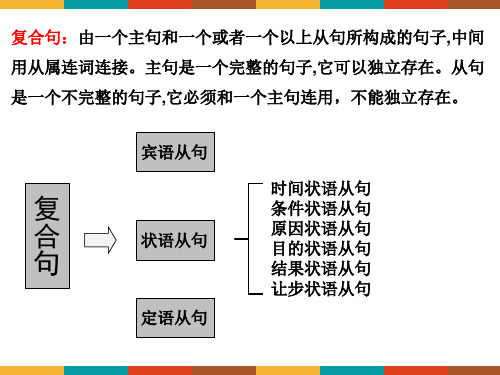
(6)since引导的时间状语从句,表示“自……以来”,主句用一 般现在时或现在完成时,从句用一般过去时。
双有连词(有意义且作成分)
连接代词:what(ever), which(ever), who(ever), whom(ever), whose
连接副词:when, where, why, how
What he wants is a bag.
2、宾语从句的语序
在含有宾语从句的复合句中,不管充当宾语从句的句子原来是什 么语序,构成宾语从句时一定要用陈述语序。
5、结果状语从句
引导词有so (that), so…that …, such…that …等 We have so much time that we can finish the work very well. 我们有如此多的时间,以至于我们能很好地完成工作。
6、让步状语从句
引导词有though/although, even though, whoever/no matter who, however/no matter how, whatever/ no matter what 和as等
It is ten years since I began (begin) to study English. 自从我开始学英语以来有10年了。
(7)as soon as引导的时间状语从句,表示“一……就”,从句 经常用一般现在时表将来。
As soon as the rain stops (stop), we will go home. 雨一停我们就回家。
中考英语语法复习 专题15-状语从句考点聚焦和精讲
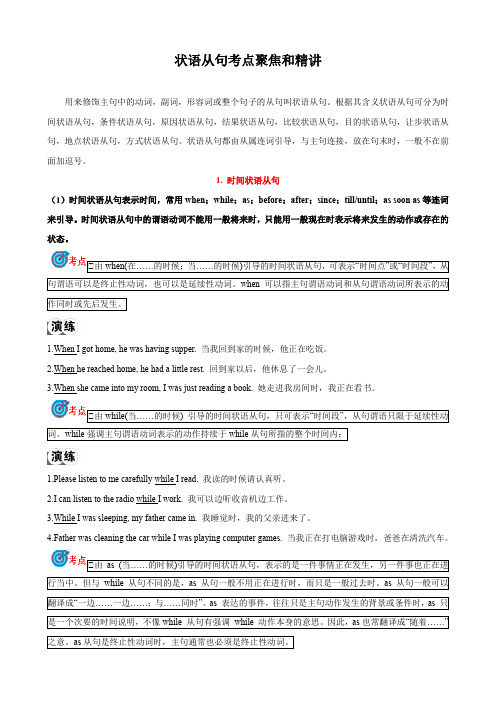
状语从句考点聚焦和精讲用来修饰主句中的动词,副词,形容词或整个句子的从句叫状语从句。
根据其含义状语从句可分为时间状语从句,条件状语从句,原因状语从句,结果状语从句,比较状语从句,目的状语从句,让步状语从句,地点状语从句,方式状语从句。
状语从句都由从属连词引导,与主句连接,放在句末时,一般不在前面加逗号。
1. 时间状语从句(1)时间状语从句表示时间,常用when;while;as;before;after;since;till/until;as soon as等连词来引导。
时间状语从句中的谓语动词不能用一般将来时,只能用一般现在时表示将来发生的动作或存在的状态。
①由when(在……的时候;当……的时候)引导的时间状语从句,可表示“时间点”或“时间段”,从句谓语可以是终止性动词,也可以是延续性动词。
when可以指主句谓语动词和从句谓语动词所表示的动作同时或先后发生。
1.When I got home, he was having supper. 当我回到家的时候,他正在吃饭。
2.When he reached home, he had a little rest. 回到家以后,他休息了一会儿。
3.When she came into my room, I was just reading a book. 她走进我房间时,我正在看书。
①由while(当……的时候) 引导的时间状语从句,只可表示“时间段”,从句谓语只限于延续性动词。
while强调主句谓语动词表示的动作持续于while从句所指的整个时间内;1.Please listen to me carefully while I read. 我读的时候请认真听。
2.I can listen to the radio while I work. 我可以边听收音机边工作。
3.While I was sleeping, my father came in. 我睡觉时,我的父亲进来了。
(完整版)中考英语状语从句考点归纳与例析

中考英语状语从句考点归纳与例析【重点讲解】中考英语试题对状语从句的考查主要涉及引导状语从句的从属连词的用法。
单项选择题的四个选项往往是四个连词,这是状语从句最常见的考查形式。
另一个考点是状语从句中的时态,因此,在学习状语从句时要弄清状语从句的几个主要类别,如时间、地点、原因、条件、让步、方式、目的、结果等,同时记住它们的“引导词”及其相关意义。
考点一:引导状语从句的连词的选择。
1、引导时间状语从句的连词主要有when, while, as, by the time, before, after, since, till/until, as soon as等。
其中when,while和as都可表示"当……时候",但用法有区别:when意为"在……时;当……时",可表示"点时间"或"段时间",从句谓语可以是终止性动词,也可以是延续性动词。
例如:When I got home, he was having supper.as意为"边……边……"或"与……同时",重在表示两个动作同时发生。
伴随进行。
as从句是终止性动词时,主句通常也必须是终止性动词。
例如: They sang as they danced.while只可表示"段时间",从句谓语只限于延续性动词。
例如:While I was sleeping, my father came in.注意:从句谓语是持续性动词时,when,while和as可以互换。
主、从句谓语都是终止性动词时,when与as可互换。
从句谓语表示状态时,通常用while。
2、引导地点状语从句的常用连词是where。
例如:Where there is a will there ia a way.3、引导原因状语从句的连接词主要有because, as, since, for。
2023年中考英语复习状语从句(条件、时间) 复习课件27张PPT

❖ 5.If Jack__p_a_s_s_e_s(pass)the entrance examination of the college,he will go to Beijing.
• 1.You can’t improve your spoken English ____ you practice itBeveryday from now on.
• A. as soon as B. unless C. if D. since
• 3.They__w__o_n_’_t_l_e_a_v_e(not leave)their classroom until the bell__r_i_n_g_s_(ring)
• 4.As soon as the police__fi_n_d__s(find)him, they
will take him home.
词的用法。
一、状语从句的概述
❖ 在复合句中修饰主句中的动词、形容词或副 词等,充当状语的成分,那么这个句子就叫 做状语从句。
❖ 状语从句通常由连接词或词组引导。从句位 于句首或句中时通常用逗号与主句隔开,位 于句尾时可以不用逗号隔开
❖ 二、时间状语从句
❖ 时间状语从句用来表示主句动作发生的时间。
❖ 引导时间状语从句的连接词有:when(while, as)当……时候; before在……之前;after在……之后;since自从;until/till直 到;as soon as一……就。
❖ 1. when(while, as) ❖ 表示主句与从句的动作同时发生。 ❖ 【例句】 ❖ Tom will go to see you when he has time. 汤姆有
【中考英语】初中英语知识点总结:宾语从句定语从句和状语从句.doc
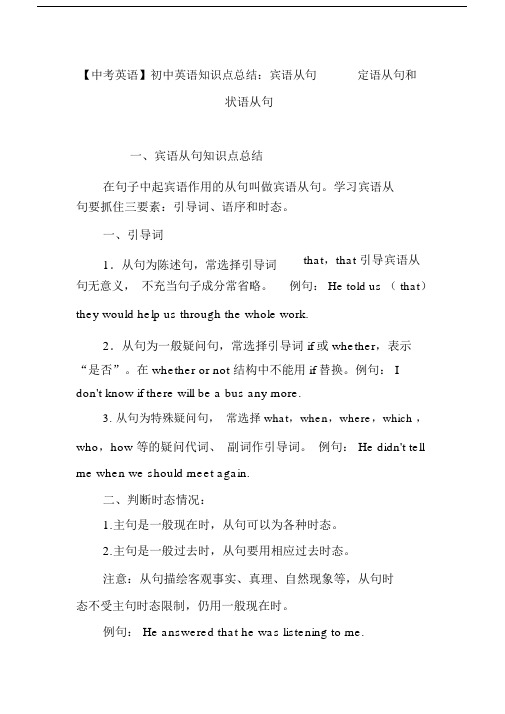
【中考英语】初中英语知识点总结:宾语从句定语从句和状语从句一、宾语从句知识点总结在句子中起宾语作用的从句叫做宾语从句。
学习宾语从句要抓住三要素:引导词、语序和时态。
一、引导词1.从句为陈述句,常选择引导词句无意义,不充当句子成分常省略。
that,that 引导宾语从例句: He told us ( that)they would help us through the whole work.2.从句为一般疑问句,常选择引导词 if 或 whether,表示“是否”。
在 whether or not 结构中不能用 if 替换。
例句: Idon't know if there will be a bus any more.3. 从句为特殊疑问句,常选择 what,when,where,which ,who,how 等的疑问代词、副词作引导词。
例句: He didn't tell me when we should meet again.二、判断时态情况:1.主句是一般现在时,从句可以为各种时态。
2.主句是一般过去时,从句要用相应过去时态。
注意:从句描绘客观事实、真理、自然现象等,从句时态不受主句时态限制,仍用一般现在时。
例句: He answered that he was listening to me.Father told me that practice makes perfect .三、宾语从句的语序要用陈述句语序陈述句语序,就是主语在前,谓语动词在后。
错误:He is wondering when can he finish this difficult job.正确:He is wondering when he can finish this difficult job.注意:宾语从句的否定转移主句的谓语动词是think , believe,imagine , suppose,consider,expect,fancy,guess 等,并且主句的主语是第一人称而且为一般现在时,从句的否定词一般要转移到主句上来,其反义疑问句一般与宾语从句一致。
2024年中考英语语法专题复习之宾语从句讲解

2024年初中英语语法专题复习之宾语从句讲解宾语从句是英语语法中的一个重要概念,它是在句子中作为宾语出现的一种从句。
宾语从句通常由连词引导,如that、whether、if、as、who、whom、whose、what、which等。
在句子中,宾语从句可以充当各种成分,如主语、宾语、表语、定语、状语等。
例如,在句子“I don’t know who will win the race.”中,宾语从句“who will win the race”作为整个句子的宾语,充当了主语所扮演的角色。
又如,在句子“She asked me if I had seen her cat.”中,宾语从句“if I had seen her cat”作为整个句子的宾语,充当了表语所扮演的角色。
宾语从句在句子中的作用多种多样,它可以作为一个完整的句子,也可以作为其他句子的成分。
在学习英语语法时,掌握宾语从句的概念和用法是非常重要的。
宾语从句和定语从句都是英语语法中的重要概念,但它们在句子中的作用和用法上有所不同。
首先,宾语从句是作为一个完整的句子出现,它可以独立存在,可以作为主语、宾语、表语等成分,而定语从句则不能独立存在,它需要作为句子的一部分,通常由关系代词或关系副词引导,用于修饰名词或代词。
其次,宾语从句和定语从句在句子中的作用也不同。
宾语从句通常作为整个句子的宾语出现,充当了主语所扮演的角色,例如“I don’t know who will win the race.”中的“who will win the race”就是宾语从句;而定语从句则通常修饰名词或代词,例如“The book that I read last week is very interesting.”中的“that I read last week”就是定语从句。
最后,宾语从句和定语从句的引导词也不同。
宾语从句通常由连词引导,如that、whether、if、as、who、whom、whose、what、which等;而定语从句通常由关系代词或关系副词引导,如who、whom、whose、which等。
专题11 宾语从句、定语从句、状语从句【课件】-2023年中考英语考前冲刺语法图解过关

宾语从句 满分秘籍
提分特训
(2)时态 宾语从句的时态原则上要与主句时态保持一致。但是如果有明显的时间 状语,要从时间状语来判断时态。 ①主句为一般现在时,从句根据实际情况使用相应的时态。如: I hearJim will leave for England tomorrow.我听说吉姆明天要去英国了。
宾语从句 满分秘籍
提分特训
②主句为一般过去时,从句要用过去的某种时态。如: Kate said she was singing at this time yesterday.凯特说她昨天这个时候在唱 歌。
满分秘籍
提分特训
③从句表示的是客观事实、真理、自然现象等时,不管主句使用什么时 态,从句都用一般现在时。 Miss Wang said that the earth goes around the sun.王老师说地球绕着 太阳转。
宾语从句 满分秘籍
提分特训
③特殊疑问句作宾语从句时用特殊疑问词引导: 问内容用what; 问时间用when/what time; 问地点用where; 问原因用why; 问方式用how等。
满分秘籍
巧学妙记
提分特训
1.(2022·黑龙江牡丹江·中考真题)— I wonder ________ Dr. Li will be at work tomorrow, sir.— I’m not sure. He is volunteering in a community.A.how B.if C.why
likesC.where our new P.E. teacher comes from D.when our new P.E. teacher was born
【答案】A 【解析】句意:——你可以告诉我我们新来的体育老师长什么样吗?——他个子很 高,短头发。考查宾语从句。what our new P.E. teacher looks like我们新来的体育老 师长什么样;what our new P.E. teacher likes我们新来的体育老师喜欢什么;where our new P.E. teacher comes from我们新来的体育老师从哪里来;when our new P.E. teacher was born我们新来的体育老师什么时候出生的。根据答句“He is tall and has short hair.”可知他个子很高,短头发。可推测问题应是询问我们新来的体育老师长什 么样。故选A。
初中英语2024届中考复习状语从句知识讲解(共9类)

中考英语状语从句知识讲解状语从句即指在主从复合句用作状语的从句。按照其意义,状语从句可分为时间状语从句、地点状语从句、原因状语从句、目的状语从句、结果状语从句、条件状语从句、让步状语从句等。学习状语从句主要应注意引导状语从句的从属连词的用法与区别,以及从属连词在一定的语言环境中的意义与用法。一、时间状语从句1.引导时间状语从句的从属连词很多,常见的有before, after, when, while, as, since, till, until, as soon as 等。2.表示“当…时候”的 while, when, as 的用法区别是:while从句中的谓语动词必须是延续性动词;表示带有规律性的“每当”或当主、从句谓语动词的动作发生有先后时,只能用when;当表示“一边…一边…”或“随着”时,只能用as。另外,用于此义的 as 所引导的时间状语从句谓语只能是动作动词,不能是状态动词。如下面一道高考题的答案是B 而不能是A:“I’m going to the post office.” “_____ you’re there, can you get me some stamps?”A.AsB.WhileC.BecauseD.If3.until 在肯定句中通常只连用延续性动词,表示相应动作结束的时间;在否定句中通常连用非延续性动词,表示相应动作开始的时间,意为“直到…才”。如:He waited until she was about to leave.他等着一直到她准备离开。I did not begin to work till he had gone.他走了后我才开始工作。4.表示“一…就”除用as soon as 外,还可用the minute, the second, the instant, immediately, directly, instantly, no sooner…than, hardly…when等。如:I came immediately you called.你一来电话我就来了。Hardly had she arrived when it began to snow.她刚到就下起雪来了。The moment I have finished I'll give you a call.我一干完就给你打电话。5.every time, each time, (the) next time, (the) last time, by the time, the first time, any time 等以time 结尾的词语也可用作连词,引导时间状语从句。如: Next time you come in, please close the door.下次你进来,请关门。He didn’t tell me anything the last time I saw him.上次我见到他时他什么也没告诉我。By the time I got home, she had already gone to bed.我到家时她已睡觉了。二、条件状语从句1.引导条件状语从句的从属连词主要有 if, unless, as [so] long as等。如:Don’t come unless I telephone.除非我打电话,否则你别来。If you watch carefully you will see how to do it.如果你仔细瞧你会看出该怎样做。As long as you do your best, we’ll be happy.只要你尽力,我们就满意了。2.in case 也可引导条件状语从句,其意为“如果”、“万一”。如:In case I forget, please remind me about it.如果我忘了,请提醒我。三、让步状语从句1.引导让步状语从句的从属连词主要有 although, though, however (=no matter how), even if(即使), whether…or(不论…还是)等连词。如:The speech is good, though it could be better.这次演讲不错,虽然还可以再好一点。He went out even though it was raining.尽管下雨,他还是出去了。2.as 也可引导让步状语从句,但要将名词、形容词或副词等提到as 前,若提前的是单数可数名词,要省略 a / an。如:Teacher as he is, he can’t know everything.虽然是老师,他也不可能什么都懂。3.连词 while 有时也可表示“尽管”、“虽然”,引导让步状语从句。如:Wh ile we don’t agree we continue to be friends.尽管我们意见不同,我们还是朋友。4.whatever, whoever, however, whenever, wherever 等引导让步状语从句。如:Don’t lose heart whatever you do.不管你做什么,都不要灰心。Whoever you are, you can’t pass this way.不管你是谁,你都不能从这里通过。注:表示“虽然”的though, although 不可与but 连用,但可与yet,still 连用。四、原因状语从句1.引导原因状语从句的从属连词主要有because, as, since, seeing (that), now (that)等:They can’t have gone out because the light’s on.他们不可能出去了,因为灯还亮着。Since you are going, I will go.既然你去,我也去。Now that we are alone, we can speak freely.现在我们单独在一起,可以随便谈了。2.除以上提到的大家比较熟悉的引导原因状语从句的从属连词外,when有时也可引导原因状语从句,其意“既然”。如:I can’t tell you when you won't listen.既然你不想听,我就不告诉你了。3.有关原因状语从句还应注意以下几点:(1) as 与since, now that 一样表示双方都知道的原因,通常位于主句前,且均不可用于强调结构被强调。(2) 当表示直接的因果关系,回答why 时,或有only, just, all, partly, not, but 等副词修饰时,或用在强调结构中都只能用because。(3) for 有时也可引出表示原因的分句,但它只能位于后面,对前一分句加以解释或推断。(4) 不要受汉语意思影响将表示“因为”的连词与表示“所以”的so 连用。五、地点状语从句引导地点状语从句的从属连词主要有where (在…的地方), wherever(无论什么地方), everywhere(每个…地方), anywhere(任何…地方)。如:I’m not living where I was.我不在原处住了。You can’t camp where [wherever, anywhere] you like these days.如今你可不能随便在哪儿宿营。Everywhere I go, I find the same thing.不管我走到哪里,我都发现同样情况。2.有的同学认为地点状语从句在平时见得不多,误认为考试不会涉及,但恰恰相反,地点状语从句却是英语考试经常考查的一个知识点。请看以下考题:(1) When you read the book, you’d better make a ma rk _____ you have any questions.A.at whichB.at whereC.the place whereD.where(2) After the war, a new school building was put up _____ there had once beena theatre.A.thatB.whereC.whichD.when(3) You should make it a rule to leave things _____ you can find them again.A.whenB.whereC.thenD.there(4) She found her calculator ______ she lost it.A.whereB.whenC.in whichD.that以上四题均选where,其意为“在…的地方”,用以引导地点状语从句。六、目的状语从句1.引导目的状语从句的从属连词主要有in order that, so that, in case, for fear 等。如:I hired a boat so that I could go fishing.我租了一条船去钓鱼。Take your coat in case it rains (should rain).带着雨衣以防下雨。He studied hard in order that he could pass the exam.他努力学习,是为了能通过考试。2.引导目的状语从句的so that 有时可省so 或that,即单独用so 或that 来引导目的状语从句。如:Check carefully, so any mistake will be caught.仔细检查,以便任何错误都可检查出。Bring it closer that I might see it better.拿近些,使我能看得清楚些。七、结果状语从句引导结果状语从句的从属连词主要有so that, so…that, such…that等。如:He was so angry that he couldn't speak.他气得话都说不出来。He shut the window with such force that the glass broke.他关窗子用力很大,结果玻璃震破了。注:so…that和such…that中的that有时(尤其在口语中)可省略。八、比较状语从句引导比较状语从句的从属连词为as...as(和……一样),not as/so...as(和……不一样),than(比),the more...the more(越……越)。这类从句常以省略形式出现。如: The work is not so difficult as you imagine.这工作不像你想像的那么困难。You look younger than you are.你看上去比你的实际年龄要年轻。The more you study, the more knowledge you can get.你学的知识越多,你的知识越丰富。He doesn’t work as hard as she (does).他工作不像她那样努力。九、方式状语从句引导方式状语从句的从属连词有as(正如),as if或as though(好像)等。如:Do as I told you.按我告诉你的那样做。As a man lives, so he dies.正如人能活,也能死。I remember the whole thing as if it happened yesterday.整个这件事我记得很清楚,就仿佛是昨天发生似的。注:口语中like也可用连词引导方式状语从句。如:Do it like he does.照他那样做。She can’t cook like her mother does.她菜做得没有她妈那样好。。
最新中考状语从句所有知识点归纳

中考状语从句所有知识点归纳知识点1状语从句的分类知识点2时间状语从句的用法知识点3地点状语从句和条件状语从句的用法知识点4原因状语从句和让步状语从句的用法知识点5比较状语从句和方式状语从句的用法知识点6目的状语从句和结果状语从句的用法知识详单知识点1状语从句的分类知识点2时间状语从句的用法知识点3地点状语从句和条件状语从句的用法知识点4原因状语从句和让步状语从句的用法知识点5比较状语从句和方式状语从句的用法知识点6目的状语从句和结果状语从句的用法考点突破考点1考查时间状语从句的用法1.(龙东中考)-Henry, please call us as soon as you _______ Hawaii.-OK. I'll do that, Mom.A. arrive inB. are arriving inC. will arrive at【解析】选择A as soon as结构意为“一……就……,”引导时间状讲从句,主句为祈使句,从句用一般现在时表示将来。
Hawaii 为大地点.因此用in.考点2考查地点状语从句的用法2.(扬州中考)-My friend has achieved his goal after years of hard work.--- Great.A·One tree can make a forest B. Where there is a will,there is a way C. Many hands make light work D. A friend in need is a friend indeed【解析】选B 第一个人阐述自己的朋友经过多年努力实现目标.,第二个人表示祝贺,同时,发表自己对此事的看法。
应该是“有志者,事竟成”.该句是where引导的地点状语从句。
考点3考查条件状语从句的用法3.(十堰中考)_________ deal with our problems, we can easily become unhappy.A. UntilB. IfC. UnlessD. Though【解析】选C。
2024年中考英语语法复习之宾语从句课件(34张PPT)(2024版)

语序篇
无论主句是陈述句还是疑问句,宾语从句都是 运用陈述句的语序,即是“主语在前,谓语在后” 的顺序。
Danny says that he will learn English.
Do you know where he came from?
Please tell me how I can get to the bus station.
主过从必过
当宾语从句说明的是客观存在的事实或者是客观存 在的真理时,就不用受到主句时态的限制,仍是用一般 现在时态。 He told me (that) Summer is after Spring.
We knew (that) the sun is much bigger than the moon .
4. they don’t know ___D___their parents will come or not.
a. that b. what c. if d. whether
5. a.
hi’ollwgitvoesaaytalikt
tomorrow.i’m b. what to say
thin c.
He will go to Hong Kong.
主过从必过
He is sick. He is reading a book.
He has finished his work.
He said
He
to Hong Kong.
He was sick.
He was reading a book.
He had finished his work.
The teacher told us (that) the earth moves around the sun.
最新中考英语重难点三大从句详解及练习
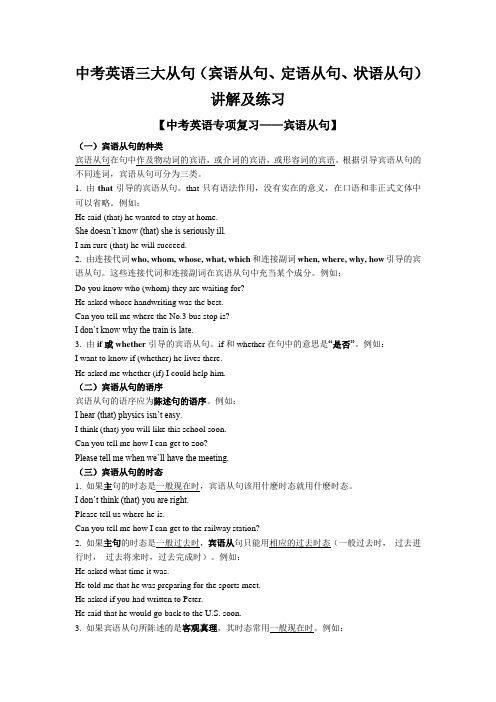
中考英语三大从句(宾语从句、定语从句、状语从句)讲解及练习【中考英语专项复习——宾语从句】(一)宾语从句的种类宾语从句在句中作及物动词的宾语,或介词的宾语,或形容词的宾语。
根据引导宾语从句的不同连词,宾语从句可分为三类。
1. 由that引导的宾语从句。
that只有语法作用,没有实在的意义,在口语和非正式文体中可以省略。
例如:He said (that) he wanted to stay at home.She doesn’t know (that) she is seriously ill.I am sure (that) he will succeed.2. 由连接代词who, whom, whose, what, which和连接副词when, where, why, how引导的宾语从句。
这些连接代词和连接副词在宾语从句中充当某个成分。
例如:Do you know who (whom) they are waiting for?He asked whose handwriting was the best.Can you tell me where the No.3 bus stop is?I don’t know why the train is late.3. 由if或whether引导的宾语从句。
if和whether在句中的意思是“是否”。
例如:I want to know if (whether) he lives there.He asked me whether (if) I could help him.(二)宾语从句的语序宾语从句的语序应为陈述句的语序。
例如:I hear (that) physics isn’t easy.I think (that) you will like this school soon.Can you tell me how I can get to zoo?Please tell me when we’ll have the meeting.(三)宾语从句的时态1. 如果主句的时态是一般现在时,宾语从句该用什麽时态就用什麽时态。
初三英语复习状语从句和宾语从句北师大版知识精讲
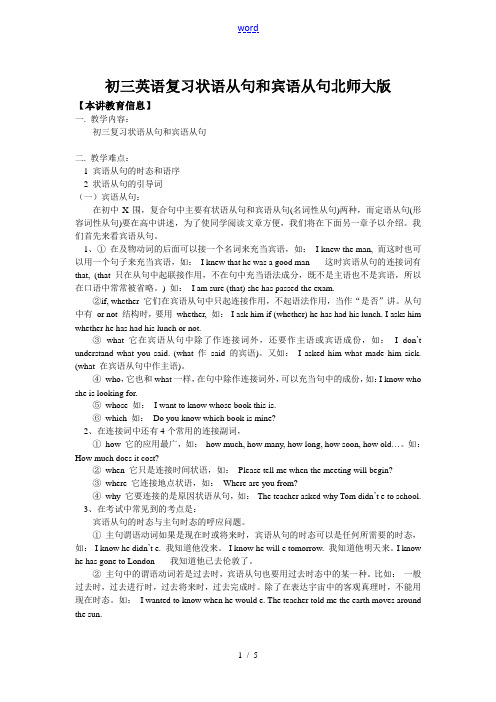
初三英语复习状语从句和宾语从句北师大版【本讲教育信息】一. 教学内容:初三复习状语从句和宾语从句二. 教学难点:1 宾语从句的时态和语序2 状语从句的引导词(一)宾语从句:在初中X围,复合句中主要有状语从句和宾语从句(名词性从句)两种,而定语从句(形容词性从句)要在高中讲述,为了使同学阅读文章方便,我们将在下面另一章予以介绍。
我们首先来看宾语从句。
1、①在及物动词的后面可以接一个名词来充当宾语,如:I knew the man, 而这时也可以用一个句子来充当宾语,如:I knew that he was a good man这时宾语从句的连接词有that, (that 只在从句中起联接作用,不在句中充当语法成分,既不是主语也不是宾语,所以在口语中常常被省略。
) 如:I am sure (that) she has passed the exam.②if, whether 它们在宾语从句中只起连接作用,不起语法作用,当作“是否”讲。
从句中有or not 结构时,要用whether, 如:I ask him if (whether) he has had his lunch. I asks him whether he has had his lunch or not.③what 它在宾语从句中除了作连接词外,还要作主语或宾语成份,如:I don’t understand what you said. (what 作said 的宾语)。
又如:I asked him what made him sick. (what 在宾语从句中作主语)。
④who,它也和what一样,在句中除作连接词外,可以充当句中的成份,如:I know who she is looking for.⑤whose 如:I want to know whose book this is.⑥which 如:Do you know which book is mine?2、在连接词中还有4个常用的连接副词,①how 它的应用最广,如:how much, how many, how long, how soon, how old…。
初中英语2024届中考语法复习状语从句知识讲解

中考英语语法复习状语从句知识讲解复合句由一个主句和一个或一个以上的从句构成,由连接词引导的句子是从句,另一句为主句。
在主从复合句中用作状语的从句叫作状语从句。
状语从句包括:时间状语从句、条件状语从句、原因状语从句、让步状语从句、结果状语从句、比较状语从句一、时间状语从句1.when 和 while 当……时1)when可以用来表示将来的某个时间会发生的事情或动作,主句用一般将来时,从句用一现在时(即"主将从现”)。
【例句】When spring comes, I'll work hard like you.当春天来临时,我将像你一样努力工作。
(由when引导的句子是从句,用一般现在时,spring是第三人称单数,用comes;另一句是主句,用一般将来时will work)特别提示:从句放在主句前面时,需要加逗号。
2) when 可以用来表示规律或客观真理,此时主句和从句都用一般现在时。
【例句】When water boils, it turns into steam.当水沸腾时,就会转变成水蒸气。
3)when 可以用来表示先后发生的两个动作,这两个动作都用一般过去时。
【例句】Lucy turned on the radio when she went back home.露西回到家就打开了收音机。
(露西回到家之后打开收音机,两个动作有先后)4)when可以用来表示一个动作(一般过去时)发生的时候,另一个动作(过去进行时)正在进行,此时 when 和 while可以互换使用。
【例句】When Ben was walking with Sam in the street, a motorcycle came towards Ben and knocked him down.当本和萨姆在街上走时,一辆摩托车冲过来,把本撞倒了。
(摩托车冲过来的时候本正在走路,所以"冲过来"用一般过去时,"正在走路"用过去进行时) 特别提示while引导的从句常用过去进行时,主句则用一般过去时。
中考英语语法精讲: 复合句(宾语从句、状语从句、定语从句)
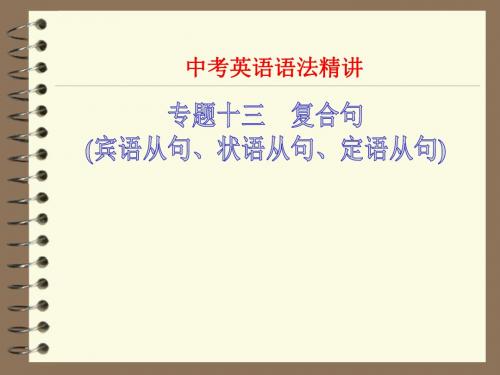
B 先行词被形容词最高级修饰时只能用关系代词that。
专题十三
复合句
( )5. People often like clothes ________ can make them look young. A. when C B.who C.that
先行词为物时可用关系代词that或which。
专题十三
复合句
Our teacher told us that the earth goes around the sun.
我们老师告诉我们地球围绕太阳转。 专题十三 复合句
3.宾语从句与否定转移 动词think, believe, suppose, expect, imagine 等后面的宾语 从句的否定词要转移到主句中,即主句的谓语动词用否定式, 而从句的谓语动词用肯定式。如: I don't think that he is honest. 我认为他是不诚实的。 4.宾语从句与简单句的转换 由特殊疑问词引导的宾语从句常可以转换为“特殊疑问词 +to do”结构的简单句。如: I don't know what I should say. = I don't know what to say. 我不知道说什么。 专题十三 复合句
中考英语语法精讲
┃宾语从句┃ 1.宾语从句的引导词及语序 (1)that 引导的宾语从句。若是 that 引导陈述句作宾语, that本身没有意义,可以省略。如: The radio says (that) it will rain tomorrow. 收音机报道说 明天要下雨。 (2)以whether 或 if 引导的一般疑问句或选择疑问句作宾语 的从句,从句改用陈述语序。 if/ whether 二者均可表示“是 否”,但与or连用分别引导两个分句,或用于不定式前、介词 后或直接与 or not 连用时,只能用whether。如:
2024年初中英语语法专题复习之三大从句的考点分析

2024年初中英语语法专题复习之三大从句的考点分析宾语从句一、定义宾语从句是英语中名词性从句的一种,在主从复合句中充当宾语。
宾语从句分为三类:动词的宾语从句、介词的宾语从句和形容词的宾语从句。
宾语从句的位置是在及物动词、介词或复合谓语之后二、连接词1.连词that- 用于引导名词性从句和形容词性从句2.连词whether- 用于引导选择疑问句或条件状语从句3.连词if- 用于引导条件状语从句4.连词as if- 用于引导虚拟语气的状语从句5.连词when- 用于引导时间状语从句6.连词where- 用于引导地点状语从句7.连词why- 用于引导原因状语从句8.连词how- 用于引导方式状语从句9.连词what- 用于引导名词性从句连词who- 用于引导名词性从句只用whether的情况:引导选择疑问句,询问某件事情是否发生或是否可能。
例如: Whether you like it or not, you have to do it.(你喜欢也好,不喜欢也罢,你必须去做。
)引导条件状语从句,表示“是否”的意思。
例如:Whether we will go to the party or not depends on your feeling.(我们是否会去聚会取决于您的感觉。
)三、时态宾语从句的时态取决于主句的时态。
如果主句的时态是现在时,宾语从句通常使用一般现在时;如果主句的时态是过去时,宾语从句通常使用过去时;如果主句的时态是未来时,宾语从句通常使用将来时。
例如:I will go to the store.(主句为将来时,宾语从句为将来时)She likes to eat pizza.(主句为现在时,宾语从句为一般现在时)He said he would meet us there.(主句为过去时,宾语从句为过去时). 定语从句一、定义定语从句是指修饰名词或代词的从句,通常使用关系代词(who, whom, whose, which, that)或关系副词(when, where, why)引导。
条件状语从句,宾语从句
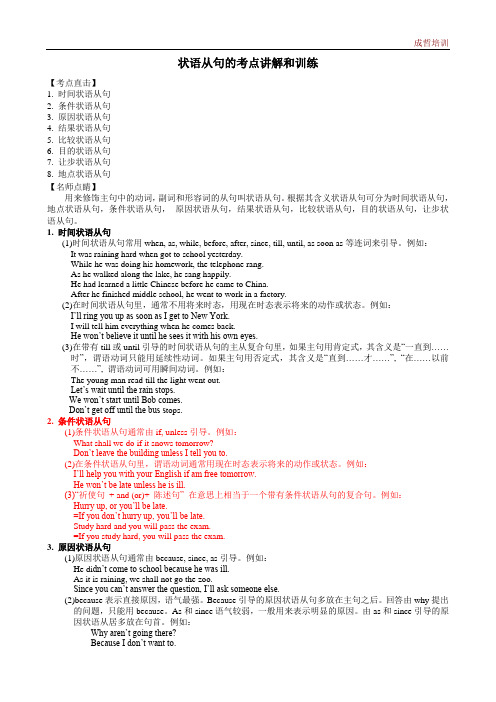
状语从句的考点讲解和训练【考点直击】1. 时间状语从句2. 条件状语从句3. 原因状语从句4. 结果状语从句5. 比较状语从句6. 目的状语从句7. 让步状语从句8. 地点状语从句【名师点睛】用来修饰主句中的动词,副词和形容词的从句叫状语从句。
根据其含义状语从句可分为时间状语从句,地点状语从句,条件状语从句,原因状语从句,结果状语从句,比较状语从句,目的状语从句,让步状语从句。
1. 时间状语从句(1)时间状语从句常用when, as, while, before, after, since, till, until, as soon as等连词来引导。
例如:It was raining hard when got to school yesterday.While he was doing his homework, the telephone rang.As he walked along the lake, he sang happily.He had learned a little Chinese before he came to China.After he finished middle school, he went to work in a factory.(2)在时间状语从句里,通常不用将来时态,用现在时态表示将来的动作或状态。
例如:I’ll ring you up as soon as I get to New York.I will tell him everything when he comes back.He won’t believe it until he sees it with his own eyes.(3)在带有till或until引导的时间状语从句的主从复合句里,如果主句用肯定式,其含义是“一直到……时”,谓语动词只能用延续性动词。
如果主句用否定式,其含义是“直到……才……”, “在……以前不……”, 谓语动词可用瞬间动词。
- 1、下载文档前请自行甄别文档内容的完整性,平台不提供额外的编辑、内容补充、找答案等附加服务。
- 2、"仅部分预览"的文档,不可在线预览部分如存在完整性等问题,可反馈申请退款(可完整预览的文档不适用该条件!)。
- 3、如文档侵犯您的权益,请联系客服反馈,我们会尽快为您处理(人工客服工作时间:9:00-18:30)。
Have a try
( )---Can you tell me ___it is from
hCome to school ?
---Sure . It is about three kilometers . A . how much B . how long C . how far D . how soon
prep.
We ’re sure (that) our team will win .
adj.
宾语从句的学习要点
1. 引导词(连接词)(conjunction)
三要素: 2. 语序 (word order)
(three elements) 3. 时态 (tense)
高频考点一:宾语从句的引导词
宾语从句的引导词可分为三种类型:
引导词 (看从句)
1.that
从句是陈述句 (口语中常省略)
2.if/whether(是否) 从句是一般疑问句
3.wh-/how(即特殊疑问词) 从句是特殊疑问句
引导词that
当宾语从句是陈述句时,连词用that 来引导,因为 that 在从句中不作任何成分,也没有任何具体意思, 因此在口语或非正式文体中常省略。
We know him .
( 代词作宾语)
I enjoy playing basketball. (动名词作宾语)
Complex predicate
宾语从句
(试比较)
We know Ma Yun .
主s. 谓v. 宾o. We know that he is a famous businessman . 主s. 谓v. 连接词 宾语从句
引导词if 或 whether
当宾语从句是一般疑问句时,连词用if或whether来 引导,If和whether在句中的意思是“是否”, 在 句中不充当成分。 我问他是否想去游泳
I ask
Does he want to go swimming ?
1.改为陈述句语序 2.用if 或whether
{
I ask if /whether he wants to go swimming.
--- Sorry , I ’ve no idea .
A . that
B . which
C . if
D . whether
高频考点二:宾语从句的语序
1.在介词后面
I am thinking of whether we should go fishing .
2.和动词不定式连用时(whether to do sth.) They asked me whether to go swimming. 3.当与or not 连用时
I don’t know whether he is free or not .
条件状语从句和宾语从句
The Object Clause
predicate
宾语(object):
宾语是动作、行为的对象,是动作的承受者。
宾语是由名词 、代词、 不定式或相当于名词的词 或短语来担当。
e.g :
I like my teacher.
(名词作宾语)
She decides to study hard . (不定式作宾语)
4.宾语从句提前表强调时 Whether this is true ,I can’t say .
引导词:疑问词
当宾语是特殊疑问句时,要用连接代词who, whom, whose, what, which和连接副词when, where, why, how来引导宾 语从句。这些连接代词和连接副词在宾语从句中充当某个成
( A ) I can’t remember ___ I put the book ,and I need it for my homework
now .
A . Where
B . how
C . What
D . Why
( D) ---Do you think___ Tom can pass the exam or not ?
分。
e.g : 我想知道你最喜欢哪一块手表?
I wonder Which watch do you like best?
1.改为陈述句语序 2.连接词就是疑问词本身
I wonder if/whether which watch you like best ?
Fill in the blanks with the correct words
z
用 I want to know 与下列句子连接成宾语从 句
Is he reading ?
If 或 whether
Do you have breakfast at six? Does Tom work hard ? Will they read books ?
Can you sing ?
只用whether 不用if的四种情况
1. Do you know who/whom they are waiting for? 2. I don’t know why the train is late . 3.Could you please tell me where the restroom is? 4.Could you tell me how I can get to the park?
定义:在句子中起宾语作用的从句叫作宾语从句。 宾语从句分为三类: 动词的宾语从句,介词的 宾语从句,形容词的宾语从句。 e.g :
He said (that) he wanted to stay at home. V.
This thing depends on how you deal with it .
1.Mary thinks (that) the teams are fantastic.
2. I hear (that) they will visit our sch来自ol tomorrow.b
1. 我们相信他是诚实的。 We believe (that) he is honest . 2.我听说他将在一个小时后回来。 I hear (that) he will be back in an hour . 他说他非常想念我们。 3.He said (that) he missed us very much .
